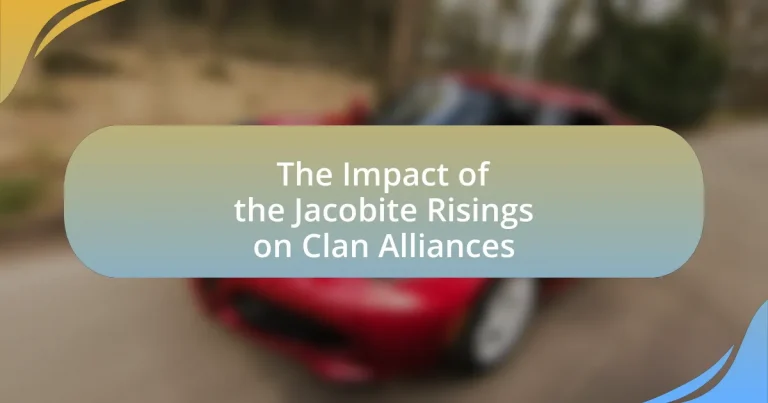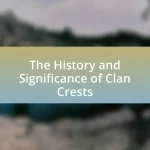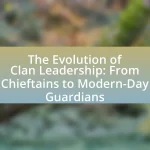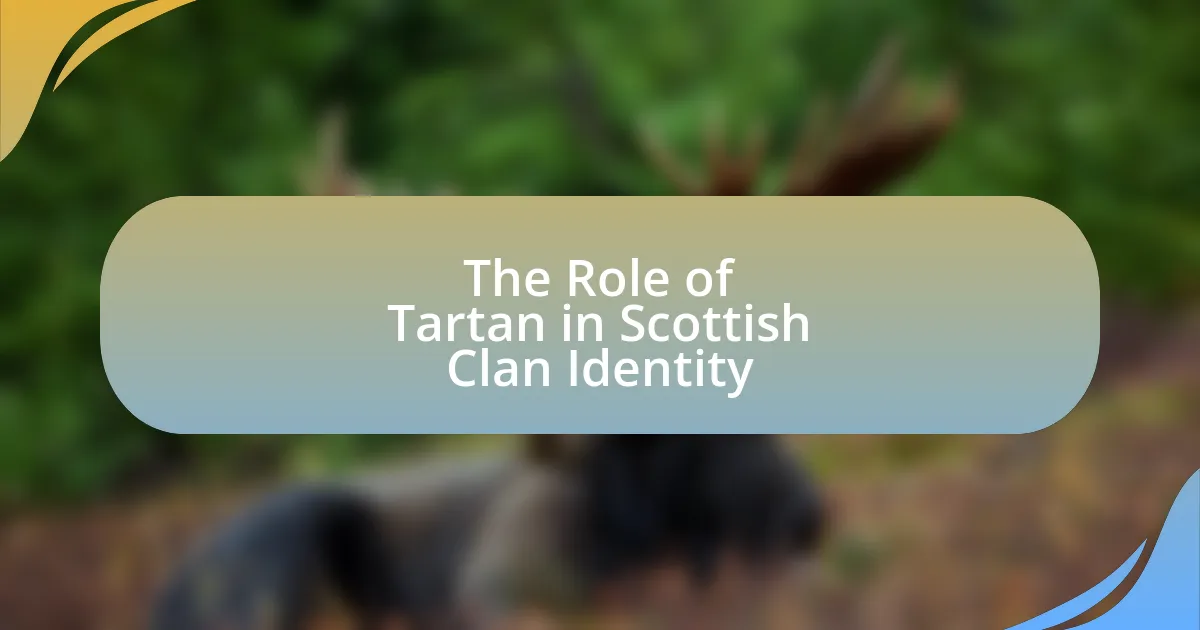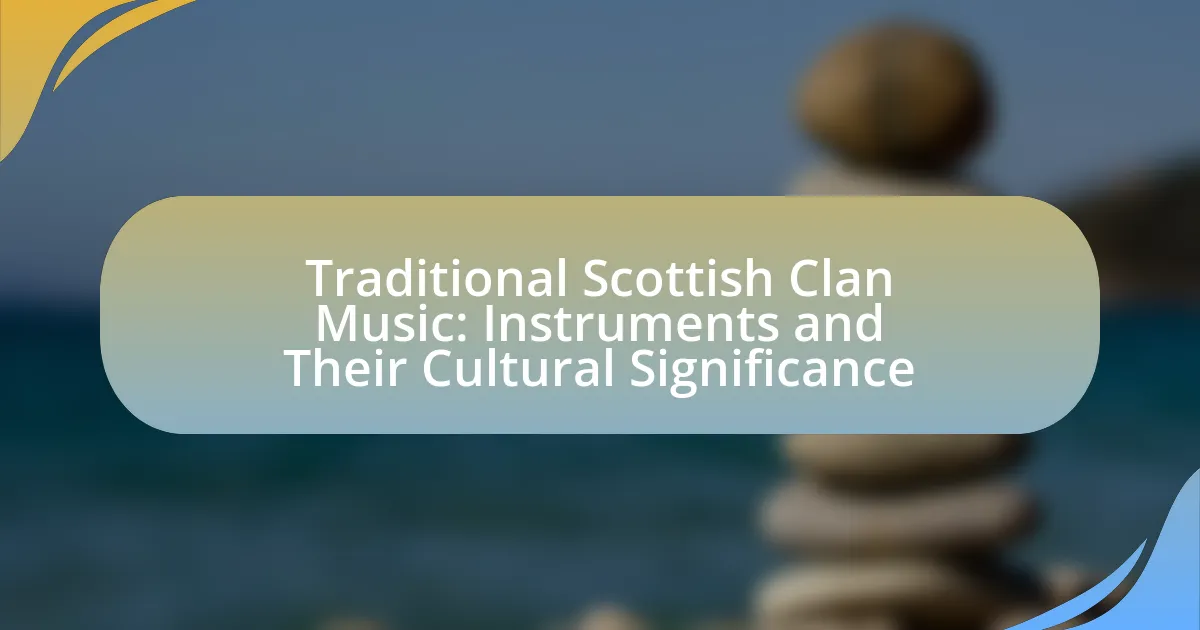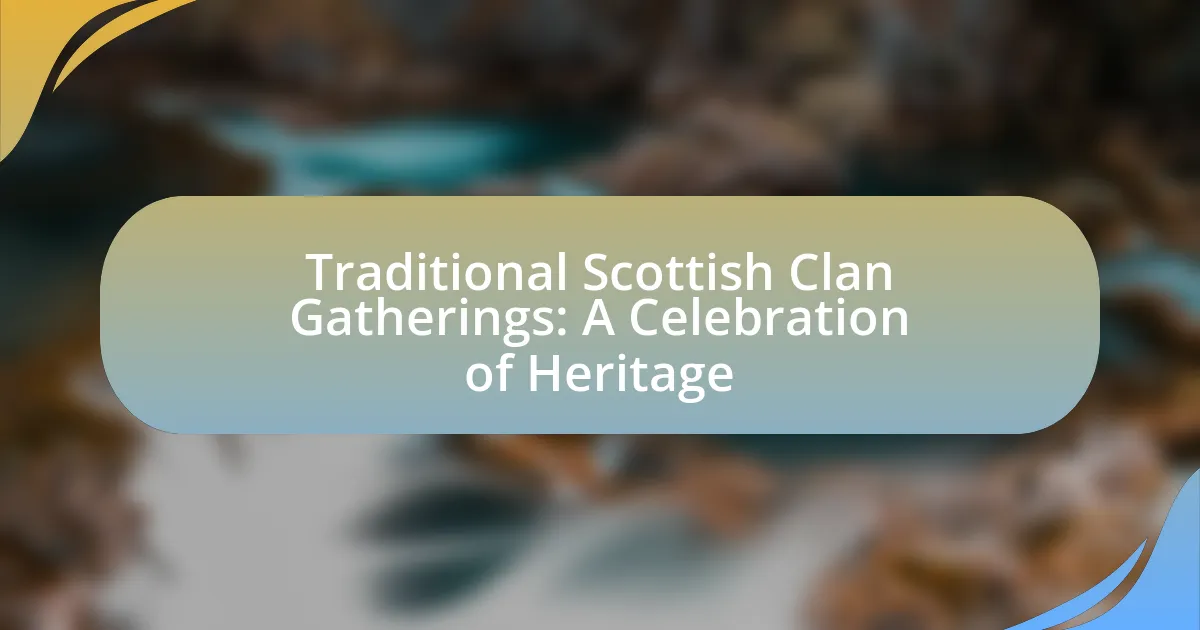The Jacobite Risings were a series of uprisings in Great Britain aimed at restoring the Stuart monarchy, particularly the claims of James II and his descendants, following the Glorious Revolution of 1688. The article examines the historical context of these risings, including the political, social, and religious tensions that fueled them, particularly in Scotland. It details the origins of the risings, key events leading to the uprisings, and the motivations behind clan support for the Jacobite cause. Additionally, the article explores how the outcomes of the risings reshaped clan alliances, influenced clan dynamics, and left a lasting impact on Scottish culture and identity. The analysis highlights the significance of these historical events in understanding contemporary clan relations and identities.
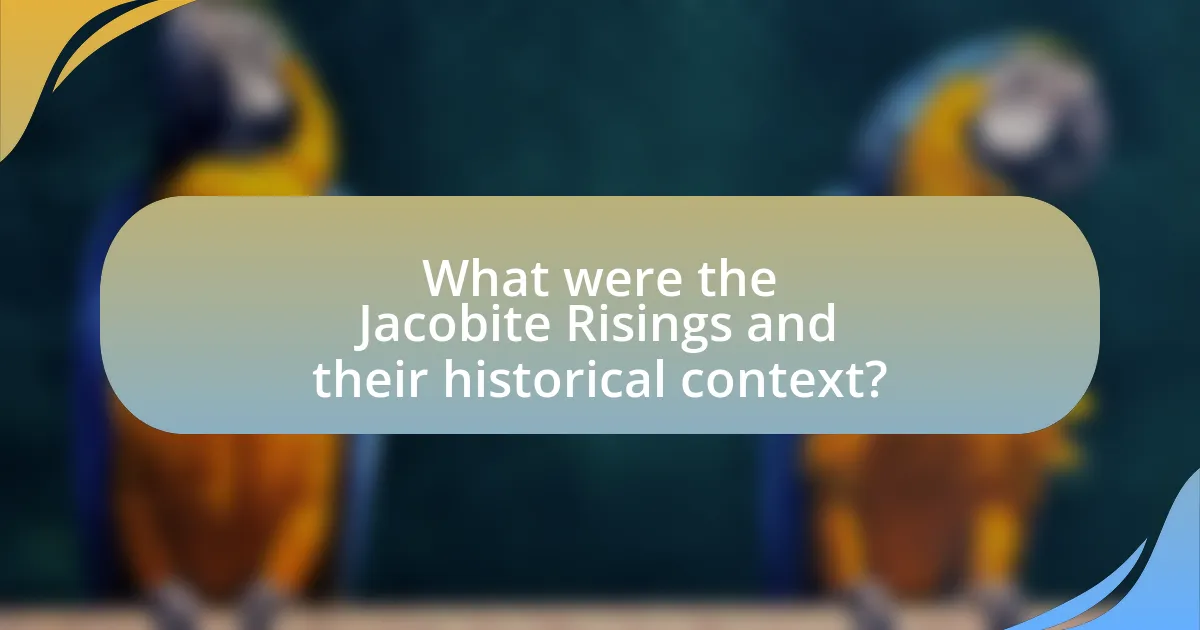
What were the Jacobite Risings and their historical context?
The Jacobite Risings were a series of uprisings in Great Britain aimed at restoring the Stuart monarchy to the throne, specifically the claim of James II and his descendants. The historical context includes the aftermath of the Glorious Revolution of 1688, which resulted in the Protestant William of Orange taking the throne, leading to discontent among Catholic supporters of the Stuart line. The first major rising occurred in 1715, followed by another significant attempt in 1745 led by Charles Edward Stuart, known as Bonnie Prince Charlie. These risings were fueled by political, religious, and social tensions, particularly in Scotland, where clan loyalties played a crucial role in mobilizing support for the Jacobite cause. The failures of these uprisings ultimately led to the decline of clan power and significant changes in Scottish society and governance.
How did the Jacobite Risings originate?
The Jacobite Risings originated from the desire of supporters of the Stuart dynasty to restore James II of England and his descendants to the throne after his ousting in the Glorious Revolution of 1688. This political movement was fueled by discontent among Scottish Highland clans, who felt marginalized under the Protestant rule of William of Orange. The first major rising occurred in 1715, led by John Erskine, the Earl of Mar, following the death of Queen Anne, which created a power vacuum. The subsequent rising in 1745, led by Charles Edward Stuart, aimed to capitalize on growing discontent and sought to rally support from various clans, ultimately leading to significant battles such as Culloden in 1746.
What were the key events leading to the first Jacobite Rising?
The key events leading to the first Jacobite Rising included the death of King James II of England in 1701, which created a power vacuum and a desire among his supporters to restore the Stuart monarchy. The 1707 Acts of Union, which unified England and Scotland, further fueled discontent among Scottish clans who felt marginalized. Additionally, the failed attempt by the Jacobites to seize power in 1708, known as the “French Expedition,” demonstrated the ongoing tensions and aspirations for a Stuart restoration. These events collectively set the stage for the uprising in 1715, as they galvanized support among various clans and highlighted the growing rift between Scotland and the English crown.
What role did political and social factors play in the Jacobite Risings?
Political and social factors were crucial in the Jacobite Risings, as they shaped the motivations and alliances of the clans involved. The desire to restore the Stuart monarchy, perceived as a legitimate ruler by many Scots, was driven by political discontent with the Hanoverian government. Socially, the clan system fostered loyalty and kinship ties, which were instrumental in mobilizing support for the Jacobite cause. For instance, the 1715 Rising saw significant backing from clans like the MacDonalds and the Camerons, who were motivated by both political aspirations and social obligations to their leaders. The interplay of these factors created a fertile ground for rebellion, as clans united under a common cause against perceived oppression.
What were the main objectives of the Jacobite Risings?
The main objectives of the Jacobite Risings were to restore the Stuart monarchy to the thrones of England and Scotland. The Jacobites aimed to reinstate James II and his descendants, who were ousted during the Glorious Revolution of 1688, thereby seeking to reclaim political power and influence for the Catholic Stuart line. Historical context shows that the risings, particularly those in 1715 and 1745, were fueled by discontent among Scottish clans and a desire for greater autonomy from English rule, as well as the preservation of traditional Scottish culture and governance.
How did the Jacobites aim to restore the Stuart monarchy?
The Jacobites aimed to restore the Stuart monarchy primarily through military uprisings and political alliances. They organized several rebellions, notably the Jacobite risings of 1689, 1715, and 1745, seeking to reclaim the throne for James II and his descendants. The Jacobites garnered support from various Scottish clans, leveraging clan loyalty and grievances against the English crown to rally troops. For instance, the 1745 uprising was significantly supported by clans such as the MacDonalds and the Camerons, who viewed the restoration of the Stuarts as a means to regain their traditional rights and lands lost after the Glorious Revolution.
What were the motivations behind clan support for the Jacobite cause?
Clan support for the Jacobite cause was primarily motivated by loyalty to the Stuart monarchy, a desire to restore traditional Scottish governance, and the promise of land and power. Many clans viewed the Jacobite cause as a means to reclaim their rights and privileges that had been eroded under English rule. Historical context shows that the 1715 and 1745 uprisings were fueled by a combination of cultural identity, resentment towards the Hanoverian government, and the hope of reinstating a Catholic monarch, which resonated with the predominantly Catholic Highland clans. The support was also driven by the prospect of military and economic benefits, as clans believed that a successful Jacobite uprising would lead to greater autonomy and prosperity for their regions.
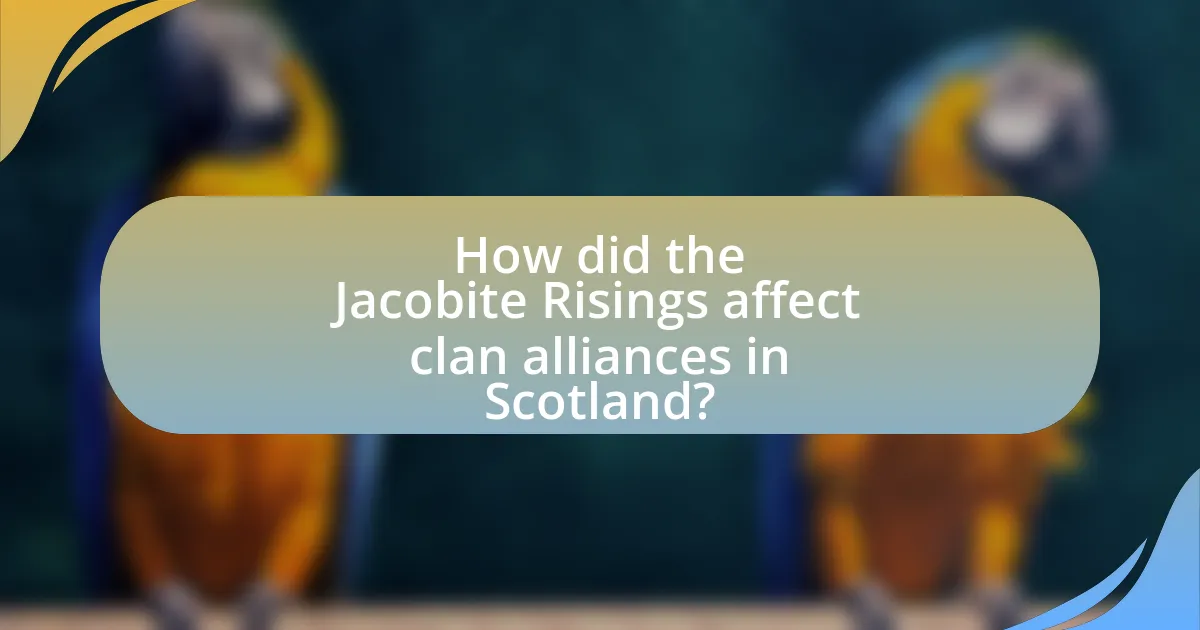
How did the Jacobite Risings affect clan alliances in Scotland?
The Jacobite Risings significantly altered clan alliances in Scotland by intensifying divisions among clans and reshaping their loyalties. During the risings, clans such as the MacDonalds and the Camerons aligned with the Jacobite cause, while others, like the Campbells, supported the Hanoverian government. This polarization led to a fracturing of traditional alliances, as clans were compelled to choose sides based on political and military interests rather than historical kinship ties. The aftermath of the risings further entrenched these divisions, as clans that had supported the Jacobites faced reprisals, leading to a long-term impact on clan relationships and power dynamics in Scotland.
What changes occurred in clan dynamics during the Jacobite Risings?
During the Jacobite Risings, clan dynamics shifted significantly as allegiances were tested and redefined. Many clans, traditionally loyal to the Scottish crown, began to align with the Jacobite cause, driven by a mix of political aspirations and personal grievances against the British government. For instance, the MacDonalds and the Camerons actively supported the Jacobite forces, reflecting a broader trend of clan solidarity against perceived oppression. Conversely, some clans, such as the Campbells, remained loyal to the British crown, leading to increased tensions and rivalries among clans. This period marked a transformation in clan relationships, where loyalty became increasingly tied to political ideology rather than solely to historical kinship ties. The outcomes of these alliances and conflicts during the Risings ultimately reshaped the landscape of Scottish clan politics and identity.
How did the Risings influence clan loyalties and rivalries?
The Jacobite Risings significantly influenced clan loyalties and rivalries by intensifying allegiances to the Jacobite cause among certain clans while exacerbating tensions between rival factions. Clans such as the MacDonalds and the Camerons rallied in support of the Jacobite movement, strengthening their loyalty to the Stuart claim to the throne. Conversely, clans like the Campbells and the Grants, who opposed the Jacobites, found their rivalries deepened as they aligned with the British government. The outcomes of the Risings, particularly the defeat at Culloden in 1746, further polarized clan dynamics, leading to a decline in traditional clan structures and an increase in animosity among clans based on their political alignments. This historical context illustrates how the Risings reshaped clan identities and relationships in Scotland.
What were the consequences of clan alliances formed during the Risings?
The consequences of clan alliances formed during the Risings included increased military strength for the Jacobite cause and significant social and political ramifications for the clans involved. These alliances allowed clans to pool resources and manpower, leading to more formidable forces against the British government. For instance, the 1745 Rising saw clans such as the MacDonalds and the Camerons unite, which bolstered the Jacobite army’s numbers and morale. However, these alliances also resulted in long-term feuds and divisions among clans, as rivalries intensified and loyalties shifted, ultimately leading to a decline in clan power and influence after the failed uprisings. The aftermath of the Risings saw punitive measures from the British government, including the disarmament of clans and the suppression of Highland culture, further altering the social landscape of Scotland.
How did the outcomes of the Jacobite Risings reshape clan relationships?
The outcomes of the Jacobite Risings significantly reshaped clan relationships by altering alliances and power dynamics among Scottish clans. Following the defeat of the Jacobite forces, particularly after the Battle of Culloden in 1746, many clans that had supported the Jacobite cause faced severe repercussions, including land confiscations and loss of status. This led to a realignment of loyalties, as clans that had previously been rivals found common ground against a shared threat from the British government. For instance, the aftermath saw clans like the Campbells and the MacDonalds reassess their relationships, often leading to new alliances formed out of necessity for survival and adaptation to the changing political landscape. The suppression of Highland culture and the imposition of British law further compelled clans to either adapt or resist, fundamentally altering traditional clan structures and relationships.
What impact did the defeat of the Jacobites have on clan power structures?
The defeat of the Jacobites significantly weakened clan power structures in Scotland. Following the Jacobite defeat at the Battle of Culloden in 1746, the British government implemented measures to dismantle the traditional clan system, including the disarming of Highland clans and the banning of tartan and Gaelic culture. These actions led to a decline in the authority and autonomy of clan chiefs, as their ability to maintain loyalty and control over their followers diminished. Additionally, many clans lost their lands and resources, further eroding their power and influence in Scottish society. The aftermath of the Jacobite risings thus marked a pivotal shift from clan-based governance to a more centralized British authority, fundamentally altering the social and political landscape of Scotland.
How did the aftermath of the Risings lead to new alliances or conflicts?
The aftermath of the Risings led to new alliances and conflicts primarily due to the shifting power dynamics among Scottish clans and the British government. Following the Jacobite Risings, clans that had previously supported the Jacobite cause faced repression, prompting some to align with the British Crown for protection and favor, while others remained loyal to the Jacobite ideals, leading to internal clan divisions. For instance, the defeat of the Jacobites in 1746 resulted in the disbandment of traditional clan structures, which forced clans like the MacDonalds to either seek alliances with the British or risk further marginalization. This realignment created a landscape of both cooperation and conflict, as clans navigated their survival in a post-Rising Scotland marked by increased government control and military presence.
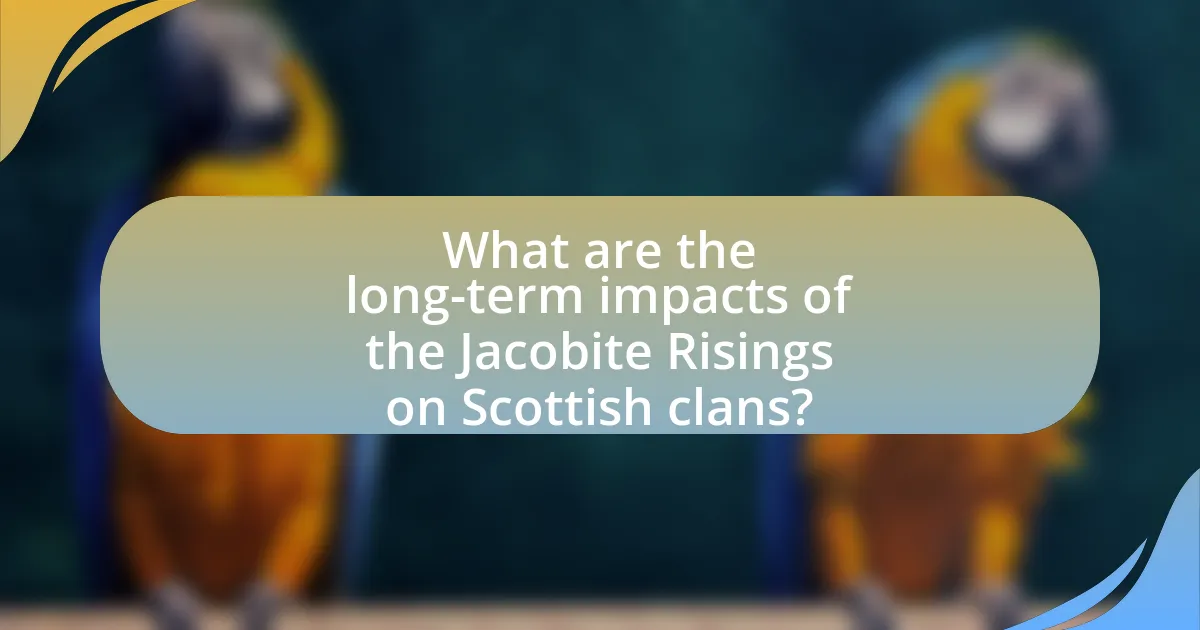
What are the long-term impacts of the Jacobite Risings on Scottish clans?
The long-term impacts of the Jacobite Risings on Scottish clans include significant changes in clan power dynamics, social structures, and cultural identity. Following the risings, many clans that supported the Jacobite cause faced severe repercussions, including land confiscations and loss of political influence, which diminished their traditional authority. For instance, the 1746 Battle of Culloden led to the defeat of the Jacobite forces and resulted in the British government’s crackdown on Highland culture, including the banning of clan tartans and the disarming of clansmen. This suppression weakened clan cohesion and altered clan alliances, as some clans shifted their loyalties to the British crown for protection and favor. Additionally, the emigration of many Highland Scots in the aftermath of the risings further fragmented clan structures, leading to a decline in the traditional clan system and the rise of a more individualistic Scottish identity.
How did the Jacobite Risings influence modern clan identities?
The Jacobite Risings significantly shaped modern clan identities by fostering a sense of unity and loyalty among Scottish clans in opposition to British rule. The Risings, particularly those in 1715 and 1745, galvanized clans around the Stuart cause, leading to a revival of clan pride and identity. This period saw clans rallying under their banners, which reinforced their distinct cultural identities and historical narratives. The aftermath of the Risings, including the suppression of clan culture and the subsequent Highland Clearances, further solidified these identities as clans sought to preserve their heritage in the face of external pressures. Consequently, modern clan identities are often rooted in the historical experiences and collective memories stemming from the Jacobite Risings, which continue to influence clan gatherings, tartans, and cultural expressions today.
What legacy did the Risings leave on clan culture and heritage?
The Jacobite Risings left a profound legacy on clan culture and heritage by reinforcing clan loyalty and identity among Scottish clans. The Risings, particularly those in 1715 and 1745, galvanized clans to unite under the Stuart cause, fostering a sense of shared purpose and collective identity. This unity was evident in the formation of clan regiments, such as the MacDonald and Fraser regiments, which fought for the Jacobite cause, thereby solidifying clan bonds and traditions. The aftermath of the Risings also led to a romanticization of clan culture, influencing literature and folklore, which celebrated the valor and heritage of clans. This cultural revival contributed to the preservation of Gaelic language and customs, ensuring that clan identities remained vibrant in the face of political and social changes.
How do contemporary clans view their historical ties to the Jacobite Risings?
Contemporary clans generally view their historical ties to the Jacobite Risings with a sense of pride and cultural identity. Many clans celebrate their ancestral connections to the Jacobite cause, which is often seen as a symbol of resistance and loyalty to the Scottish heritage. For instance, clans such as the MacKenzies and the MacDonalds actively commemorate their involvement in the Risings through events, gatherings, and educational initiatives that highlight their historical significance. This perspective is reinforced by the ongoing interest in Scottish history and the romanticized narratives surrounding the Jacobite movement, which continue to resonate within clan communities today.
What lessons can be learned from the clan alliances during the Jacobite Risings?
The clan alliances during the Jacobite Risings illustrate the importance of unity and strategic collaboration in achieving common goals. These alliances, formed among various Scottish clans, were crucial in mobilizing support for the Jacobite cause, demonstrating that collective action can amplify strength against a more powerful adversary, such as the British government. Historical evidence shows that clans like the MacDonalds and the Camerons played significant roles in battles like Culloden, highlighting how their cooperation was essential for the Jacobite efforts. Additionally, the eventual fragmentation of these alliances due to differing interests and loyalties underscores the challenges of maintaining unity in pursuit of a shared objective, teaching that internal cohesion is vital for sustained collective action.
How can understanding these alliances inform current clan relations?
Understanding historical alliances formed during the Jacobite Risings can provide valuable insights into current clan relations by highlighting patterns of loyalty, conflict, and cooperation among clans. For instance, the alliances that emerged during the Jacobite Risings often dictated clan allegiances and rivalries, which continue to influence modern clan dynamics. Historical records indicate that clans such as the MacDonalds and the Campbells had longstanding enmities rooted in their positions during these uprisings, shaping their interactions today. By analyzing these historical contexts, clans can better navigate contemporary relationships, recognizing the legacies of past alliances and conflicts that still resonate in their social and political interactions.
What strategies can clans adopt to navigate modern alliances based on historical contexts?
Clans can adopt strategies such as forming coalitions, leveraging historical grievances, and utilizing shared cultural identities to navigate modern alliances based on historical contexts. For instance, during the Jacobite Risings, clans often united against a common enemy, which illustrates the effectiveness of coalition-building. By recalling these historical alliances, modern clans can foster unity and collaboration in contemporary contexts, drawing on shared experiences and cultural narratives to strengthen their positions. Additionally, recognizing historical grievances can help clans articulate their interests and negotiate better terms in modern alliances, as seen in the aftermath of the Jacobite Risings when clans sought to reclaim their status and lands.
